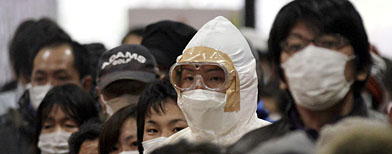 WASHINGTON (Reuters) – The United States showed increasing alarm about Japan's nuclear crisis on Wednesday and urged its citizens to stay clear of an earthquake-crippled power plant, going further in its warnings than Japan itself.The State Department said the United States has chartered aircraft to help Americans leave Japan and had authorized the voluntary departure of family members of diplomatic staff in Tokyo, Nagoya and Yokohama -- about 600 people.
WASHINGTON (Reuters) – The United States showed increasing alarm about Japan's nuclear crisis on Wednesday and urged its citizens to stay clear of an earthquake-crippled power plant, going further in its warnings than Japan itself.The State Department said the United States has chartered aircraft to help Americans leave Japan and had authorized the voluntary departure of family members of diplomatic staff in Tokyo, Nagoya and Yokohama -- about 600 people."The State Department strongly urges U.S. citizens to defer travel to Japan at this time and those in Japan should consider departing," it said.
As operators of the Fukushima plant tried to douse overheating reactors, U.S. officials warned about the risks of getting anywhere near the area and relied on their own officials for details about the danger.
"The situation has deteriorated in the days since the tsunami and ... the situation has grown at times worse with potential greater damage and fallout from the reactor," White House spokesman Jay Carney told reporters.
U.S. officials took pains not to criticize the Japanese government, which has shown signs of being overwhelmed by the crisis that began after last Friday's devastating 9.0 magnitude earthquake and resulting tsunami.
But Washington's actions indicated a divide with the Japanese about the perilousness of the situation.
U.S. President Barack Obama told Japanese Prime Minister Naoto Kan in a telephone call that the United States will do all it can to help Japan recover, the White House said.
"The president briefed Prime Minister Kan on the additional support being provided by the U.S., including specialized military assets with expertise in nuclear response and consequence management," it said in a statement.
The State Department recommended that U.S. citizens within 50 miles of the plant leave the area or stay indoors.
Japan's government has asked people living within 12 miles to evacuate and those between 12 miles and 18 miles to stay indoors.
PLUME OF RADIATION
Gregory Jaczko, the top U.S. nuclear regulator, cast doubt on efforts to cool overheating reactors, saying workers may be hit with "lethal doses" of radiation.
"It would be very difficult for emergency workers to get near the reactors," Jaczko said.
A United Nations forecast projects the radioactive plume from the Fukushima facility would reach the Aleutian Islands on Thursday and hit Southern California late on Friday, The New York Times reported.
The projection, calculated on Tuesday and obtained by the newspaper, gives no information about actual radiation levels, it said. Health and nuclear experts emphasize that radiation in the plume will be diluted as it travels and will have extremely minor health consequences in the United States, it reported.